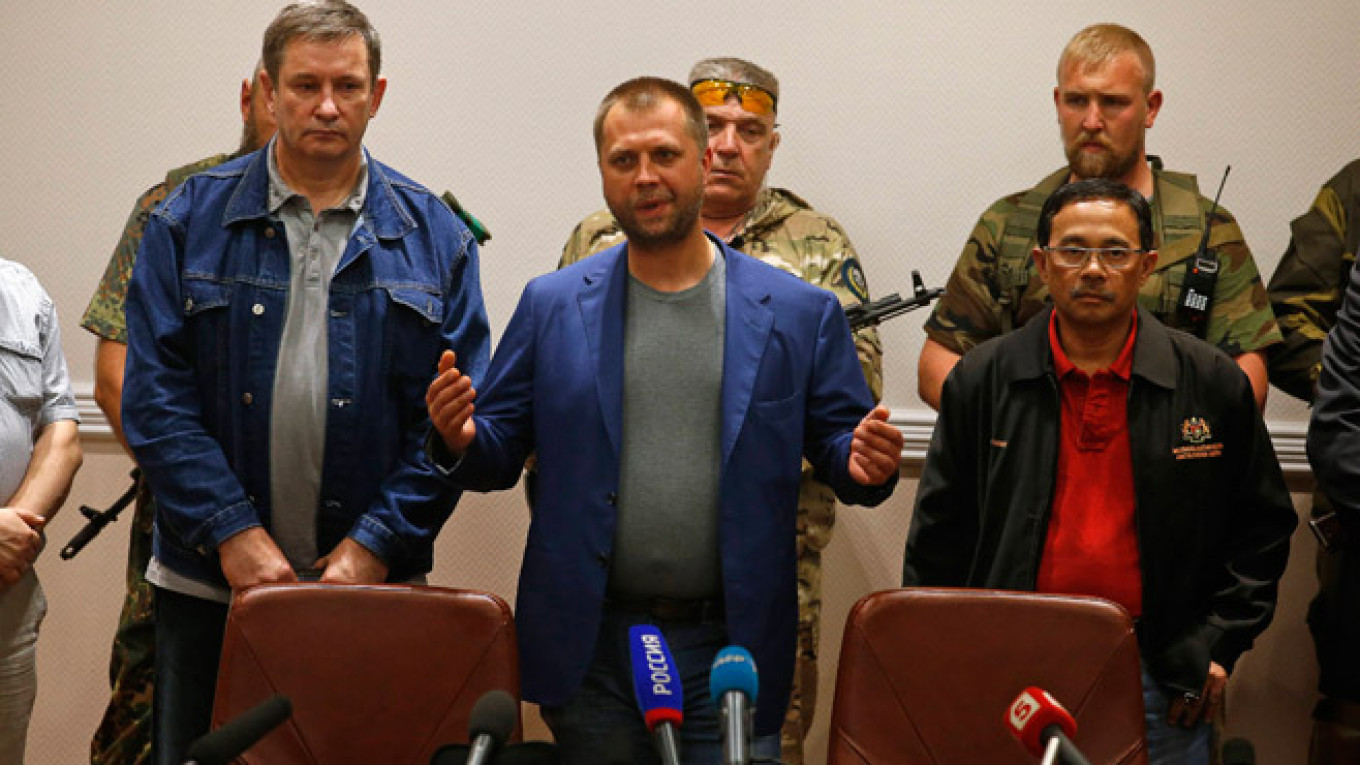The fathers of rebel leaders say the darndest things.
Case in point: Philosopher Yury Borodai — the father of eastern Ukraine rebel leader Alexander Borodai — who posited in a monograph that ape evolved into man not through labor, but through masturbation and sexual repression.
The theory is laid out in the late professor Borodai's Russian-language work "Erotica. Death. Taboo.," which was originally published in Moscow in 1996.
Man's evolutionary predecessors are believed to have lived in hierarchical groups, where alpha males enjoyed exclusive domain over the females.
Borodai argued that lower-ranking males, who could not get mates in real life, had to resort to sex with imaginary females, i.e. masturbation, which fostered the development of vivid imagination and stronger cognitive facilities.
At some point, according to the elder Borodai, these bottom-shelf males mated with their less desirable female counterparts, ultimately leading to the emergence of the relatively creative and clever Homo Sapiens.
"Erotica. Death. Taboo." had lingered in obscurity for two decades before hitting the spotlight thanks to Borodai Jr., a second-generation philosopher, with a notably stronger propensity toward war than his father.
Borodai Jr., 41, a graduate of Moscow State University's philosophical faculty, has worn many hats in his professional life, having served as a war correspondent in Chechnya, a PR consultant and a volunteer fighter with the pro-Russian insurgents in the breakaway province of Transdnestr in the then-Soviet republic of Moldova in 1991.
His rebel experience came in handy this spring, when he took on the role of prime minister of another pro-Russian insurgent state, the currently-besieged People's Republic of Donetsk in eastern Ukraine.
Insurrection ideologues have referred to the start of a "Russian Spring" — a hypothetical process whereby Russian-speaking territories that became parts of other countries following the Soviet Union's downfall would rejoin mainland Russia.
But in fact, Borodai Sr. coined the term "Russian Spring" soon after the Soviet Union's downfall, according to excerpts from an article on Russian nationalism he penned in 1994, which was quoted by the website Ttolk.ru.
The theory did not come by chance: Borodai Pere was part of an intellectual circle that also included religious philosopher Alexei Losev and controversial historian Lev Gumilev.
Gumilev's work is popular with post-Soviet conservatives, among whom it has frequently been cited to justify nationalist conflicts.
But nationalist theorizing was a late-career priority for Borodai Sr. in his four-plus decades at the philosophical faculty of the Moscow State University and the Institute of Philosophy at the Soviet Academy of Sciences, most of which were spent exploring the origins of morals and imagination — work that culminated in the production of "Erotica. Sex. Taboo."
Borodai Jr. could not be reached for comment by telephone on Tuesday.
The insurgent leader — who himself is not known to have a girlfriend — said in an interview with Svpressa.ru in May that his life and work have been influenced by the historian Gumilev, though he has never publicly commented on his father's theories.
Russia's leading expert on the evolution of primate and human behavior, ethologist and anthropologist Maria Butovskaya, said on Tuesday she was unaware of Borodai Sr.'s theories.
When briefed on his conclusions by The Moscow Times, Butovskaya, a professor at the Institute of Anthropology and Ethnography at the Russian Academy of Sciences, dismissed them as "nonsense."
The evolution-through-masturbation theory, an uncritical offshoot of Freudianism, was a product of the Iron Curtain, said prominent Russian philosopher and columnist Maxim Goryunov.
Postwar Soviet researchers were all but denied access to Western academic literature, including, in Borodai Sr.'s case, criticism of Freud's theories, Goryunov said in e-mailed comments.
"Things have improved since," said Goryunov, himself a graduate of Moscow State University's philosophical faculty.
"Borodai's work still features on reading lists on anthropology, but as a curiosity and a starting point for a discussion, not a serious scientific theory," he said.
See also:
Ukraine Conflict Divides Families, Neighbors
Contact the author at a.eremenko@imedia.ru
A Message from The Moscow Times:
Dear readers,
We are facing unprecedented challenges. Russia's Prosecutor General's Office has designated The Moscow Times as an "undesirable" organization, criminalizing our work and putting our staff at risk of prosecution. This follows our earlier unjust labeling as a "foreign agent."
These actions are direct attempts to silence independent journalism in Russia. The authorities claim our work "discredits the decisions of the Russian leadership." We see things differently: we strive to provide accurate, unbiased reporting on Russia.
We, the journalists of The Moscow Times, refuse to be silenced. But to continue our work, we need your help.
Your support, no matter how small, makes a world of difference. If you can, please support us monthly starting from just $2. It's quick to set up, and every contribution makes a significant impact.
By supporting The Moscow Times, you're defending open, independent journalism in the face of repression. Thank you for standing with us.
Remind me later.


